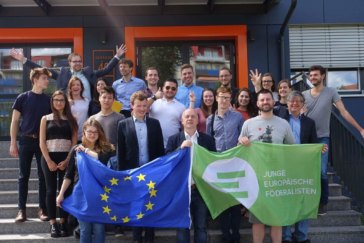“Alternative Europa!” discusses the Defense Union with youth in Magdeburg

The project “Alternative Europa!” was invited to discuss the recently published reflection paper “European Defense” with young people in Magdeburg on 10 June 2017. Within the framework of a two-day seminar at the Otto-von-Guericke University, organized by the Young European Federalists (JEF) Sachsen-Anhalt, young people from all over Europe gathered to reflect on the White Paper Process launched by the European Commission. Alongside the question of the future path of European integration posed by the EU Commission with its five scenarios for the future of the EU, the workshop participants also discussed the four reflections papers which have been published up until now.
Martin Luckert, Federal Secretary of the JEF, together with Julian Plottka, Research Fellow at IEP, gave an overview of three scenarios for the creation of the defense union brought up for discussion by the Commission in its reflection paper. All participants in the workshop declared themselves in favor of a swift deepening of integration in the realm of defense policies. It was clear in the discussion that today, defense policy is no longer restricted to military policy, but rather also encompasses critical infrastructure such as telecommunications networks, energy security, and policies for stabilization achieved through civilian means. The policy area also has a broad overlap with questions regarding domestic security. This wide spectrum of topics must be reflected in further steps towards integration in the realm of defense policies.
Whether such advancements could be achieved in the near future, participants remained skeptical. It was scrutinized whether or not sufficient political willingness exists for an expeditious implementation of the more extensive proposals. Yet it was stated that, given the ambiguous attitude of the United States’ new administration towards NATO, the conflict in Ukraine, the assessment of Russia as a strategic challenge and the dangerous situation in the Middle East, political pressure currently exists which could be used in order to strengthen the EU’s defense policies. However, the goal which Europe puts forward in the international realm with a single voice is constrained by differing national strategic cultures. It could take generations for a continent-wide consensus to be reached concerning the tasks for which the military should be engaged.
Whether or not forms of differentiated integration might offer a way out remained an equally contentious question within the debate. While such groupings of member states would make it easier to establish a consensus and shared understanding about the role of the military, having individual groups of member states forge ahead also always carries with it the risk of dividing the Union. Whether or not “stragglers” would ever catch up remains unanswered.
Report: Julian Plottka.
